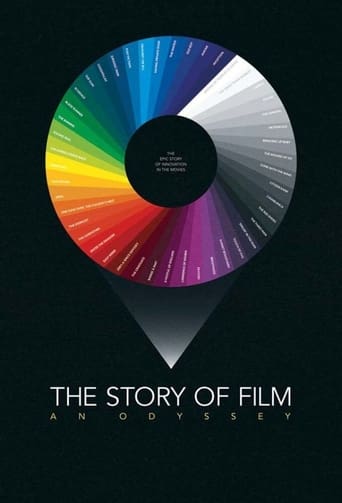grantss
Probably the most extensive documentary made on the history of film, and deserves respect for that alone.I particularly liked the objective stuff, the historical development of film, the pivotal moments and movies. Hated Mark Cousins' narration: first time I attempted to watch the series I gave up after 10 minutes- his intonations were that irritating. Second time round I gritted my teeth and eventually got accustomed to his narration (still didn't like it though). Also hated the pretentiousness of the subjective stuff. Yes, its art, so critiquing movies is by definition subjective, but Cousins glorifies movies and directors which/who are clearly not worth of that degree of praise. Some of it is pure "Look at how clever I am - I just mentioned a director/movie you've never heard of". Cousins is very up himself.Overall it was an edifying experience, but could have been a lot better.
mwakee
While I can abide Cousins' anti-Hollywood viewpoint and I can abide the political slant to his series, I cannot abide his trumpeting of the film Hyenes directed by Djibril Diop Mambéty, without even mentioning that it was based on a play by Swiss writer Frederich Durrenmatt. Not only that, but there was a previous film version, The Visit, directed by Bernhard Wicki in 1964, starring Ingrid Bergman and Anthony Quinn. While Mambety created a brilliant film, he did not pull this film out of a vacuum by himself. It was an adaption and Cousins should have made us aware of this fact. It calls into question the veracity of the entire series, which I had enjoyed up until now. I'll need to watch the rest of the series with a far more critical eye.
Vihren Mitev
Something special just for lovers. Did not even know that I'm one before I watched the series. A stunning walk in film history in more than a century of film making.The series begins with a careful explanation of how people came to the idea of shooting movies and continues with monitoring the development of film techniques and acting over the years. The viewer is told how the art evolves frame by frame, how new approaches emerge, who borrows techniques from whom and who makes remakes of whom.From the early silent films to the latest headlines, published last year, the story of the film keeps us in suspense and puts us questions. How much are we familiar with valuable titles in the industry? Do we know the directors? Of course we could never have film coverage that is offered to us, because it consists of film history all around the world! I personally stopped by, and wrote down, about 180 titles to watch and the whole amount was probably something like 250. This will be the second project, after the war films, in which I put myself and will keep you informed on its development.http://vihrenmitevmovies.blogspot.com/
rosewood-6
I just finished watching this series and was really disappointed in the IMDb reviews. Here are my pointers for those who are interested in seeing this considerable work.1. The majority of the people of the world have accents different than those found in America. If you can't get beyond a person's accent to hear the content of what he/she is saying, stick with Entertainment Tonight.2. This series is like a "string theory" of film- everything is connected to everything. While some of the reviewers could not follow the train of thought, much of what is documented is the initial use of what are now considered stock shots and plots and how they are still being used today. Film history is not just what films were made, but also the creation and evolution of the art form.3. This series also deals heavily in international cinema. Episode 3 deals with cinema in the 1920's in Paris, Berlin, Moscow, Shanghai and Tokyo. Episode 6 shows works from Egypt, India, China, Mexico that was created in the 1950's. Episode 8 chronicles the birth of African cinema in the 1970's. There is more about international cinema in this series than I have ever seen in any program about film.So, if you want to see a comprehensive series on the history of film, as opposed to the history of Hollywood, this is the series for you.



